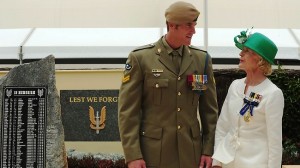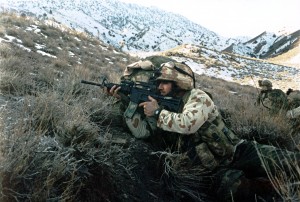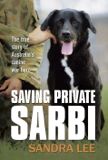
Corporal Benjamin Roberts-Smith after receiving the Victoria Cross for courage under fire in Afghanistan in 2010 (pic by Cpl Chris Moore, via AAP)
Of all the Australia Day awards that have been handed out today the one that stands out most to me is the Commendation for Gallantry to an anonymous Digger identified only as “Private J, NSW”.
The citation reads: “For acts of gallantry in action as a team member during heavy and sustained enemy fire on Operation Slipper in Afghanistan in 2009″.
For acts of gallantry: that is code for bravery and courage under fire against an armed and dangerous enemy. We won’t know who Private J is for some time as he will be a member of either the Special Air Service Regiment like the highly decorated Corporal Benjamin Roberts-Smith, VC, MG, or the Commandos or the Incident Response Regiment – all of whom work under the cover of anonymity for Operational Security reasons.
The Commendation for Gallantry is significant in its own right – it is ranked fourth in the gallantry commendations behind the Victoria Cross, the Star of Gallantryand the Medal for Gallantry. Private J was seriously brave on his patrol, as the commendation is only awarded for “acts of great heroism and conspicuous gallantry in times of great peril”.
The words “great heroism” and “great peril” are indication enough. And he is not alone. Several other “alphabet” soldiers were also recognised including Corporal A and Private A.
But Private J’s award, like those of his fellow soldiers, is especially poignant coming in the same week that Cpl Roberts-Smith, or RS as his mates know him, was awarded the highest honour for courage under fire, the Victoria Cross for Australia.
RS is now Australia’s most highly decorated soldier, having previously been awarded the prestigious MG for his bravery in the line of fire in Afghanistan in 2006. He is the second SAS trooper to receive the VC for actions in Afghanistan and joins Corporal Mark Donaldson, VC, in the very elite club in which there are only three surviving of the 98 VC recipients, the other being Keith Payne, a Vietnam veteran.
It is worth noting that Sergeant P, another member of RS’s SAS patrol, was recognised today in the Australia Day honours with the Star of Gallantry for his bravery under fire.
Earlier this week in a round of interviews held after RS was announced as Australia’s newest VC he said, “Every soldier deserves to have the country know how willing they are to be out there”.
I couldn’t agree more. They put their hand up to serve our country and put themselves in the line of fire.

Signalman Martin 'Jock' Wallace, MG, fighting for his life in Operation Anaconda in Afghanistan 2002
When I wrote 18 Hours, The True Story of an SAS War Hero I spent hundreds of hours with Signaller Martin ‘Jock’ Wallace who was the first Australian to receive the Medal For Gallantry since the Vietnam War.
It was an enormous honour to be in the company of such a fine and decent gentleman, but I was always struck by one thing – Martin’s humility. He told me he felt like an imposter.
Not because he hadn’t earned the respect that comes with the MG, which he received for helping save the lives of many coalition troops when they were ambushed by a superior number of al Qaeda and Taliban insurgents in the Shahi Kot Valley in southern Afghanistan in Operation Anaconda. But because as he and so many other reluctant heroes say, “I was just doing my job and doing what all my mates were doing. Just about everyone deserved a medal that day”.
Cpl Roberts-Smith said pretty much the same this week. The giant of a man, who has his chest tattooed with the words “I will not fail my brothers”, had a one word answer when asked what made him expose himself to enemy fire to silence Taliban machine-gunners to ensure the safe return of his SAS patrol: “Mateship”.
Goosebumps, right?
Then the happily married, father of twin daughters, added: “I think the biggest sin in my line of work is to let your mates down. You just can’t do it. As those blokes did for me that day, I did for them. It’s that simple. They fought next to me as hard as they could and I gave them 100 percent.”
Now that’s heroism. Real heroism. It is the same type of extraordinary courage in the face of danger displayed by so many ordinary people during the recent floods.
Heroism is instinctive. It can’t be learned. It is innate. That’s why it is so important to acknowledge and celebrate it because when we see it, we understand how it truly can change lives and save souls.

